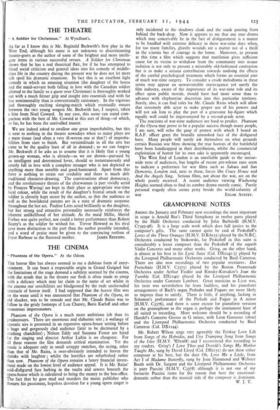A Soldier for Christmas." At Wyndham's.
THE THEATRE
AS far as I know this is Mr. Reginald Beckwith's first play in the West End, although his name is not unknown to discriminating theatre-goers as the author of some of the brighter and more intelli- gent items in various successful revues. A Soldier for Christmas shows that he has a real theatrical flair, for if he has attempted to blend social criticism and general ideas into his comedy of middle- class life in the country during the present war he does not let mere talk spoil his dramatic situations. In fact this is an excellent light comedy in which an amusing situation (the daughter of the house and the maid-servant both falling in love with the Canadian soldier allotted to the family as a guest over Christmas) is thoroughly worked out with a much firmer grip and insight into essentials and with far less sentimentality than is conventionally customary. In the vigorous and thoroughly exciting slanging-match which eventually ensues between the two young woqien Mr. Beckwith has, I suspect, taken a hint from Noel Coward. In any case, this scene can stand com- parison with the best of Mr. Coward at this sort of thing—of which,
so far, he has been the unrivalled master. • We are indeed asked to swallow one great improbability, but this is next to nothing in the theatre nowadays when so many plays are a mere tissue (and often a very ill-woven one at that!) of improba- bilities from start to finish. But verisimilitude in all the arts has come to be the quality least of all in demand ; so we can forgive Mr. Beckwith if he asks us to assume that it is likely that a young grown-up woman, who is already—as we are shown—pursued by an intelligent and determined lover, should so instantaneously and utterly fall in love with a complete stranger who is not depicted as anything more than sensible and good-humoured. Apart from this there is nothing to strain our credulity and there is much deft traditional character-drawing. The conversations about democracy, and the revolutionary threats of the charwoman (a part vividly acted by Frances Waring) are kept in their place as appropriate war-time local colour, while the result of the daughter's frontal attack on the soldier is cleverly kept secret by the author, so that the audience as well as the bewildered parents are in a state of dramatic suspense throughout the last act. Pauline Letts acted brilliantly as the daughter, but her strong and attractive personality necessarily reinforces the inherent unlikelihood of her attitude. As the maid Millie, Meriel Forbes was quite perfect, nor could a better performance than Robert Beatty's as the soldier be wished for. Trevor Howard as his rival gave more distinction to the part than the author possibly intended, and a word of praise must be given to the convincing realism of
Joyce Barbour as the flustered mother. JAMES REDFERN.


























 Previous page
Previous page